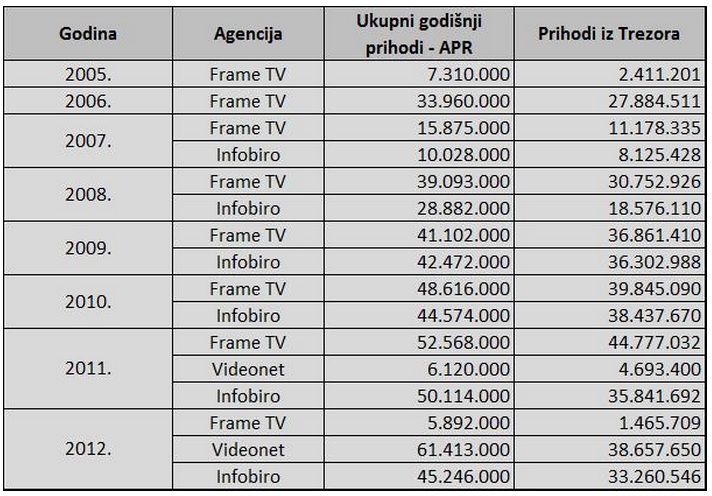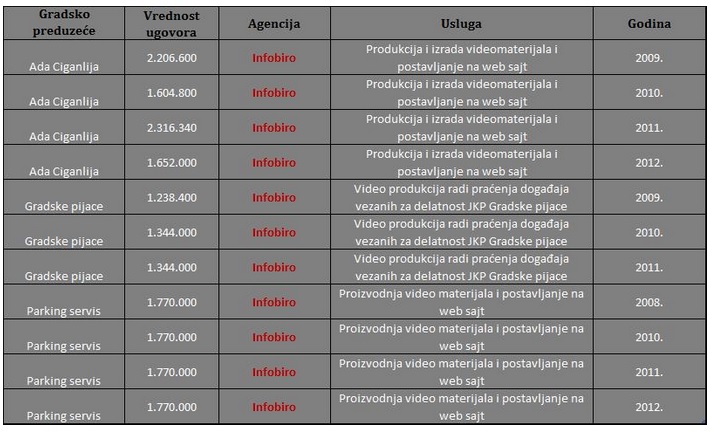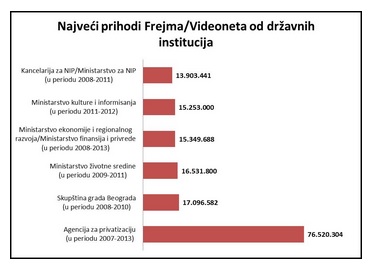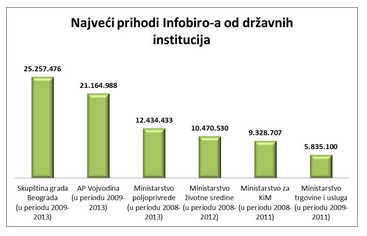Most of the contracts that the state signed with Infobiro, Frame and Videonet were signed without tenders. The Law on Public Procurement stipulates that public tenders for services of radio and television production are not obligatory.
In addition to the basic contract fee, the Privatisation Agency obliged itself to cover all the firms’ travel expenses when crews travelled abroad, including the cost of visas, transport, accommodation and per-diem allowances for the cameraman and editor.
Frame continued to produce video material for the Agency until 2012, when Videonet took over the job. The Agency terminated its contract with Videonet in October 2013.
The Agency has refused to divulge its reasons for this, saying only that former officials, sacked in November 2013 were responsible for the pricey contracts. Belgrade City Assembly paid the three firms a total of over €361,700 from 2008 to 2013 to cover city events and city officials, and produce two TV series, Beogradski detektiv and Beograd.rs. According to documentation that BIRN obtained, between 2008 and 2012, three city public enterprises, Ada Ciganlija, Gradske Pijace and Parking Servis, signed contracts worth €163,600 with Infobiro.
Despite the change of government in 2012, state institutions continued to cooperate with some of these companies. Treasury data show that in the first half of 2013, these institutions paid about €172,000 to Videonet and another €120,000 to Infobiro.
BIRN documentation covering data up until June 2013 shows that the ministries of Natural Resources, of Agriculture, of Trade and Telecommunications and of Regional Development and Local Government, all had contracts with either Infobiro or Videonet.
Some have terminated the contracts. The Economy Ministry told BIRN it scrapped its contract with Videonet when Sasa Radulovic, the current minister, took office. According to the ministry, the monthly fee of €4,100 was deemed unaffordable and not worth it.
“The service was unnecessary as the ministry has its own department in charge of contacts with the media… and Tanjug news agency, Beta and Fonet do the same job and charge it to the media,” the ministry told BIRN.
No searching questions asked
At some key events, the state has given priority in terms of media coverage to private companies, raising questions about whether a dividing line is being observed between journalistic coverage and pure promotion.
Ljubisa Paunovic, however, says: “It is impossible to work without Infobiro.”
“When [Bosnian Serb general] Ratko Mladic was arrested, Prime Minister Mirko Cvetkovic called us because he was under huge pressure from the international media asking for his statement,” Sanja Ignjatovic said.
“We alone were invited to video him, because all those media outlets could then take that material quickly and in full quality,” Ignjatovic explained, adding that the Prime Minister had not been a client.
Infobiro’s owners say they are proud of the number of times that their videos have been used around the world.
"Since we started working, we have often been the only ones invited to cover major events in the country, because only we have the quality and knowledge,” Ignjatovic said.
“This includes funeral of [Serbian Church head] Patriarch Pavle, the gathering of the Non-Aligned Movement, Biden’s visit ... None of them were clients of ours,” she added.
Infobiro also covers more mundane events across Serbia, such as openings of new factories and roads, visits by politicians to villages and their meetings with local people. However, the questions that Infobiro asks on these occasions are sometimes suggested by the spokespersons of the institutions in question. Either way, Infobiro is expected to film whatever the politicians have to say.
While Infobiro fills this niche, not many other media in Serbia have the cash or the staff - who might ask more searching questions - to send reporters to such events.
Pedja Blagojevic, former chief of Infobiro office in Nis, now editor at the website Juzne Vesti, recalls that when he started working for Infobiro in 2008, one of his tasks was to film a tobacco producer’s reaction to a new cigarette tax. He says that when he asked his bosses what questions to put, they said: “Don’t ask anything, just go there, as he knows what he will say. And this man, the farmer, praised the state for the changes it was making,” Blagojevic recalls.
This reportage was duly uploaded onto the Infobiro website along with an optimistic-sounding statement by the then Agriculture Minister, Sasa Dragin, another Infobiro client. “Using those two statements, the media got its story, but none of them asked any representatives of the cigarette industry, who would have been critical, for their opinion,” Blagojevic said. “Whether that was down to laziness or editorial policies, I don’t know.” He said he soon realised that, “It was a clear case of government spin to provide backing for their decision”.
Ljiljana Smajlovic says one problem lies in the fact that the media, under the pressure of their own poor financial circumstances, knowingly participate in this fraud. "If the video material of these agencies was clearly marked as material for ‘authorised release’, it would be at least alert the public to approach that propaganda with caution,” Smajlovic said.
Editors of news programs in the electronic media told BIRN that they mainly rely on Infobiro for when they lack resources to cover events.Marija Mitrovic, desk editor at RTS desk, says the station only uses Infobiro material in emergencies; usually they send their own journalists.
Far from transparent
No one questions the need to inform the public of the latest steps officials have taken. Many states have set up their own internal agencies exactly for this purpose.
The problem in Serbia does not lie so much in the quality or nature of the services provided by private companies, but whether it is a defensible use of budget funds, which already finance Tanjug and RTS.
Private news agencies also complain of unfair competition. Ljubica Markovic, director of Beta, a private news agency, criticises “unfair competition that threatens us directly”. “These agencies don’t depend on the sale of their content, while news agencies have to live off subscriptions,” she recalled. Why should any media outlet pay a subscription fee when they can download content for free?” Markovic asked.
 The Serbian state has long been hiring three private companies to produce material that TV stations use for free – the problem is that viewers don’t know this is not news but PR.
The Serbian state has long been hiring three private companies to produce material that TV stations use for free – the problem is that viewers don’t know this is not news but PR.

 Sanja Ignjatovic, director of Infobiro, says the company answers a public and institutional need, while compensating for the media’s inability to send crews to attend all these events. “TV stations in Serbia daily seek help to cover events as they lack the production capacity to do so, so, we’re the bond and ask the questions instead of them,” she said. While some experts and unions say the media are effectively broadcasting covert propaganda, not independent coverage, editors respond that while they cover crucial events alone, they rely on Infobiro for material on official statements.
Sanja Ignjatovic, director of Infobiro, says the company answers a public and institutional need, while compensating for the media’s inability to send crews to attend all these events. “TV stations in Serbia daily seek help to cover events as they lack the production capacity to do so, so, we’re the bond and ask the questions instead of them,” she said. While some experts and unions say the media are effectively broadcasting covert propaganda, not independent coverage, editors respond that while they cover crucial events alone, they rely on Infobiro for material on official statements.






